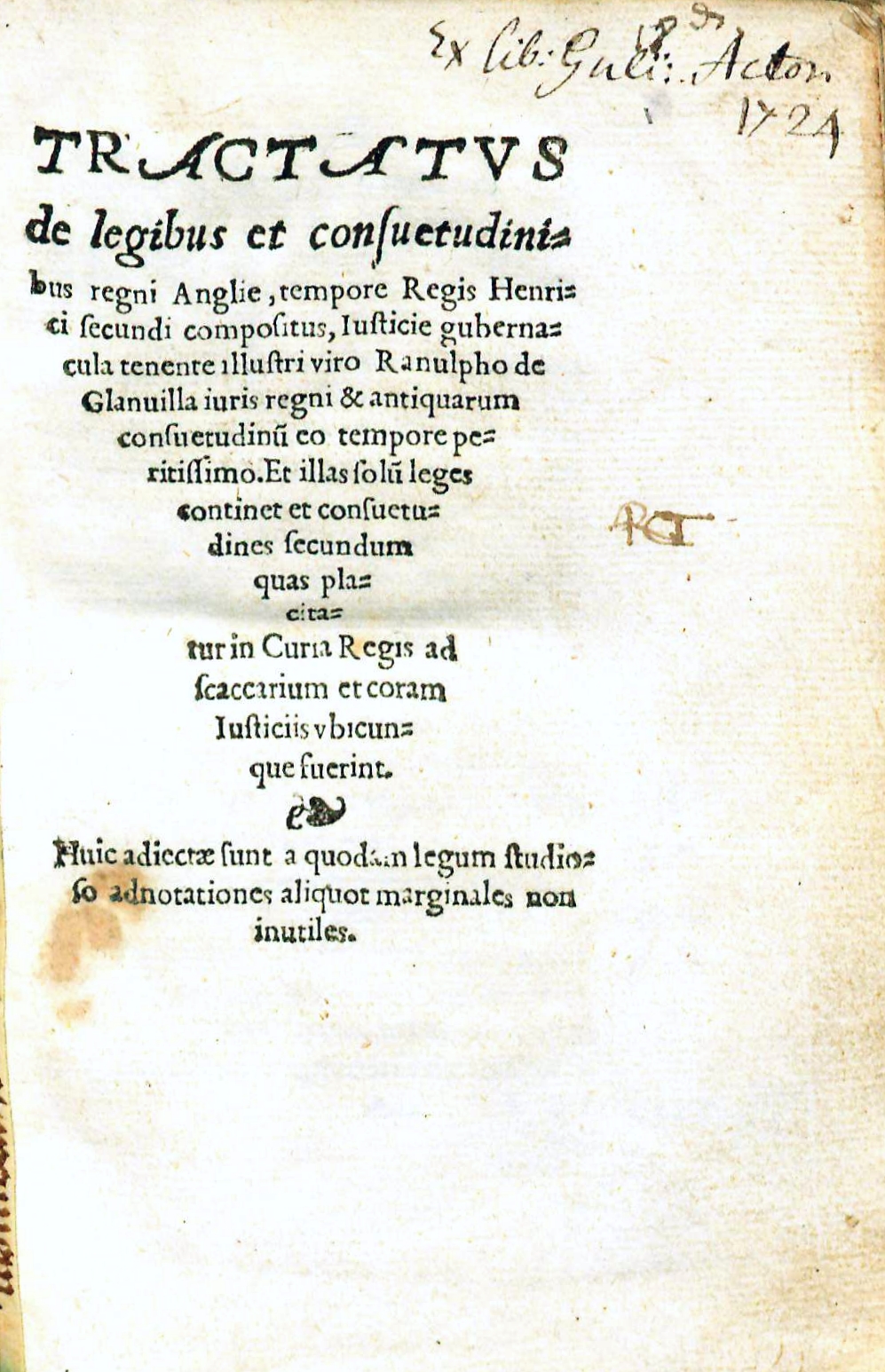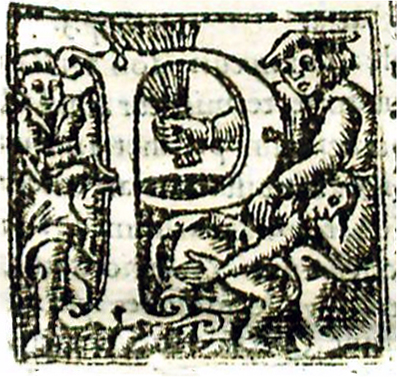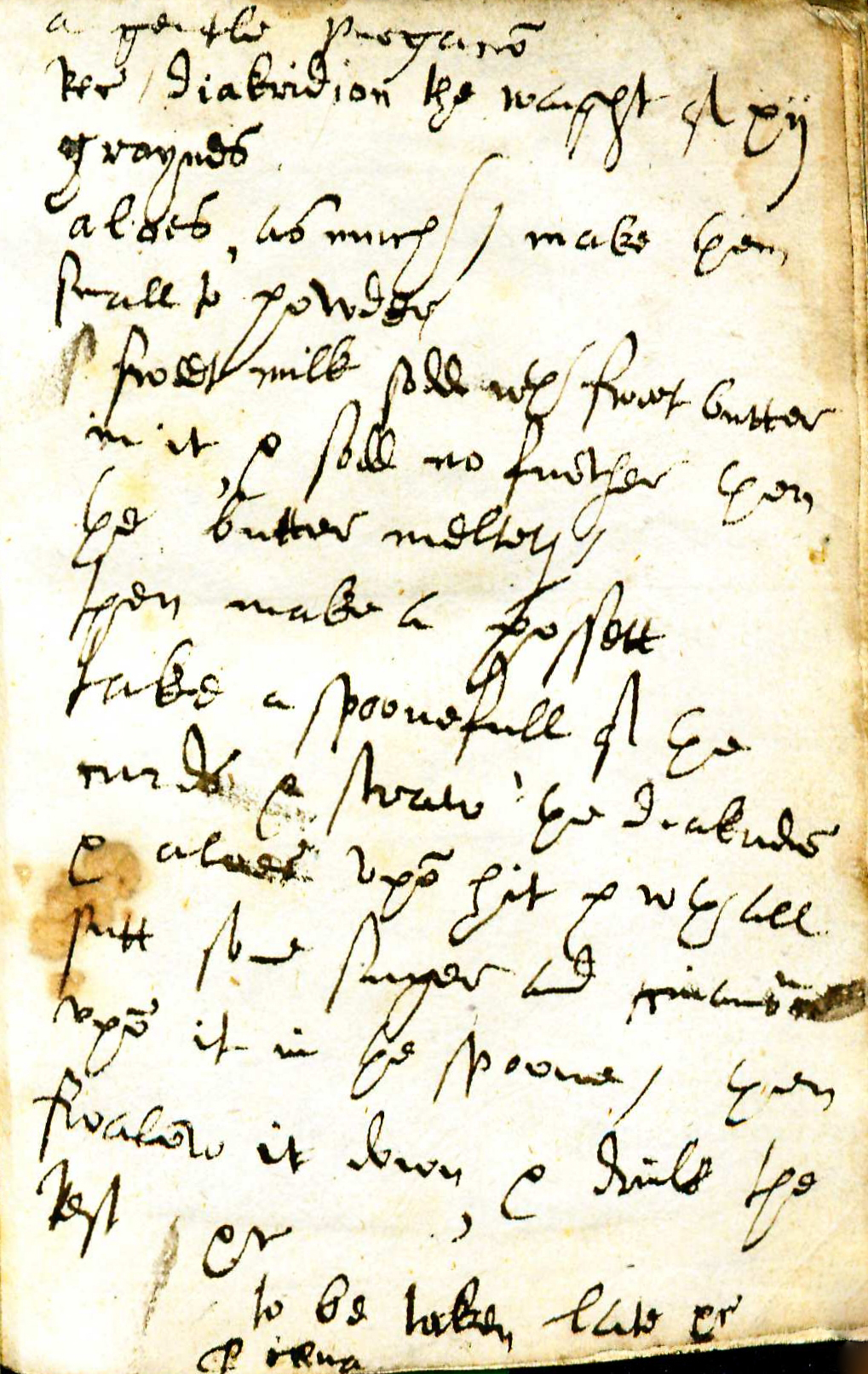Difference between revisions of "Tractatus de Legibus et Consuetudinibus Regni Angliae"
(fn) |
|||
| Line 16: | Line 16: | ||
|pages=[6] pages, 113 (i.e. 116) numbered leaves, [34] pages | |pages=[6] pages, 113 (i.e. 116) numbered leaves, [34] pages | ||
|desc=12mo (14 cm.) | |desc=12mo (14 cm.) | ||
| − | }}[[File:GlanvilleTractatus1554InitialCapital.jpg|left|thumb|200px|<center>Initial capital, first page of text.</center>]][http://en.wikipedia.org/wiki/Ranulf_de_Glanvill Ranulf de Glanville] (1120s?–1190) was born in Stratford in Suffolk, the son of Sir Hervey de Glanville, Chamberlain to [http://en.wikipedia.org/wiki/Stephen,_King_of_England King Stephen]. After serving as [http://en.wikipedia.org/wiki/High_Sheriff_of_Yorkshire sheriff of Yorkshire] from 1163 to 1170, he was appointed keeper of the honour of Richmond in 1171 and [http://en.wikipedia.org/wiki/High_Sheriff_of_Lancashire sheriff of Lancashire] in 1174.<ref>John Hudson, "[http://www.oxforddnb.com/view/article/10795 Glanville, Ranulf de (1120s?–1190)] | + | }}[[File:GlanvilleTractatus1554InitialCapital.jpg|left|thumb|200px|<center>Initial capital, first page of text.</center>]][http://en.wikipedia.org/wiki/Ranulf_de_Glanvill Ranulf de Glanville] (1120s?–1190) was born in Stratford in Suffolk, the son of Sir Hervey de Glanville, Chamberlain to [http://en.wikipedia.org/wiki/Stephen,_King_of_England King Stephen]. After serving as [http://en.wikipedia.org/wiki/High_Sheriff_of_Yorkshire sheriff of Yorkshire] from 1163 to 1170, he was appointed keeper of the honour of Richmond in 1171 and [http://en.wikipedia.org/wiki/High_Sheriff_of_Lancashire sheriff of Lancashire] in 1174.<ref>John Hudson, "[http://www.oxforddnb.com/view/article/10795 Glanville, Ranulf de (1120s?–1190)]" in ''Oxford Dictionary of National Biography'', accessed November 21, 2013.</ref> Other offices followed, including [http://en.wikipedia.org/wiki/Justiciar justiciar] of England in 1180. With this position, Glanville effectively became [http://en.wikipedia.org/wiki/Henry_II_of_England Henry II]'s chief minister during the later part of Henry's reign. Glanville died at [http://en.wikipedia.org/wiki/Siege_of_Acre_%281189%E2%80%9391%29 Acre] in 1190 while on crusade with [http://en.wikipedia.org/wiki/Richard_I_of_England King Richard].<br /> |
<br /> | <br /> | ||
| − | According to tradition, Glanville wrote ''Tractatus de Legibus et Consuetudinibus Regni Angliae'' (''Treatise on the Laws and Customs of the Kingdom of England''), the “earliest treatise on the common law,” <ref>William Holdsworth, ''A History of English Law'' (London: Methuen & Co., Sweet and Maxwell, 1936), 2: 189.</ref> "a manual concerning royal judicial procedures."<ref>Hudson, "Glanville, Ranulf de."</ref> The treatise was composed sometime after 1187, and many writers suggest that the attribution to Glanville is incorrect, proposing instead E. de Narbrough, Henry II,<ref>J. G. Marvin, ''Legal Bibliography or a Thesaurus of American, English, Irish, and Scotch Law Books'' (Philadelphia: T. & J. W. Johnson, Law Booksellers, 1847), 336.</ref> or [http://en.wikipedia.org/wiki/Hubert_Walter Hubert Walter].<ref>Holdsworth, ''A History of English Law,'' 189.</ref> Regardless of the authorship, the volume "will not cease to be regarded as a venerable historical monument, the first collected rays of the old Common Law."<ref>Marvin, ''Legal Bibliography'', 337.</ref> | + | According to tradition, Glanville wrote ''Tractatus de Legibus et Consuetudinibus Regni Angliae'' (''Treatise on the Laws and Customs of the Kingdom of England''), the “earliest treatise on the common law,” <ref>William Holdsworth, ''A History of English Law'' (London: Methuen & Co., Sweet and Maxwell, 1936), 2:189.</ref> "a manual concerning royal judicial procedures."<ref>Hudson, "Glanville, Ranulf de."</ref> The treatise was composed sometime after 1187, and many writers suggest that the attribution to Glanville is incorrect, proposing instead E. de Narbrough, Henry II,<ref>J. G. Marvin, ''Legal Bibliography or a Thesaurus of American, English, Irish, and Scotch Law Books'' (Philadelphia: T. & J. W. Johnson, Law Booksellers, 1847), 336.</ref> or [http://en.wikipedia.org/wiki/Hubert_Walter Hubert Walter].<ref>Holdsworth, ''A History of English Law,'' 189.</ref> Regardless of the authorship, the volume "will not cease to be regarded as a venerable historical monument, the first collected rays of the old Common Law."<ref>Marvin, ''Legal Bibliography'', 337.</ref> |
==Evidence for Inclusion in Wythe's Library== | ==Evidence for Inclusion in Wythe's Library== | ||
| − | Wythe ordered "Glanville" from John Norton & Sons in a letter dated May 29, 1772. Records indicate the order was fulfilled.<ref>Frances Norton Mason, ed., ''John Norton & Sons, Merchants of London and Virginia: Being the Papers from their Counting House for the Years 1750 to 1795'' (Richmond, Virginia: Dietz Press, 1937), 242-243. The letter is endorsed "Virga. 29 May 1772 / George Wythe / Recd. 21 September / Goods Entr. pa. 163/ Ans. the March 1773."</ref> "Glanvil. 12mo." is also listed in the [[Jefferson Inventory]] of [[Wythe's Library]]. This was one of the titles kept by [[Thomas Jefferson]], who sold copies of both the first (1554) and second (1673) editions of ''Tractatus de Legibus et Consuetudinibus Regni Anglie'' to the Library of Congress. Both volumes still exist today, but neither has definitive markings linking it to Wythe.<ref>E. Millicent Sowerby, ''Catalogue of the Library of Thomas Jefferson'', 2nd ed. (Charlottesville: University Press of Virginia, 1983), 2:211-212 [no.1769-1770].</ref> The [https://digitalarchive.wm.edu/handle/10288/13433 Brown Bibliography]<ref>Bennie Brown, "The Library of George Wythe of Williamsburg and Richmond," (unpublished manuscript, May, 2012) Microsoft Word file. Earlier edition available at: https://digitalarchive.wm.edu/handle/10288/13433.</ref> includes both editions at the Library of Congress. [http://www.librarything.com/profile/GeorgeWythe George Wythe's Library]<ref>''LibraryThing'', s. v. "[http://www.librarything.com/profile/GeorgeWythe Member: George Wythe]," accessed on March 5, 2014.</ref> on LibraryThing and Goodwin's pamphlet<ref>Mary R. M. Goodwin, [http://research.history.org/DigitalLibrary/View/index.cfm?doc=ResearchReports\RR0216.xml ''The George Wythe House: Its Furniture and Furnishings''] (Williamsburg, Virginia: Colonial Williamsburg Foundation Library, 1958), XLVIII.</ref> both list the second (1673) edition. Because we do not know which edition Wythe owned, and because the Wolf Law Library prefers first editions when the edition is unknown, the library moved a copy of the 1554 from another rare book collection to the [[George Wythe Collection]]. | + | Wythe ordered "Glanville" from John Norton & Sons in a letter dated May 29, 1772. Records indicate the order was fulfilled.<ref>Frances Norton Mason, ed., ''John Norton & Sons, Merchants of London and Virginia: Being the Papers from their Counting House for the Years 1750 to 1795'' (Richmond, Virginia: Dietz Press, 1937), 242-243. The letter is endorsed "Virga. 29 May 1772 / George Wythe / Recd. 21 September / Goods Entr. pa. 163/ Ans. the March 1773."</ref> "Glanvil. 12mo." is also listed in the [[Jefferson Inventory]] of [[Wythe's Library]]. This was one of the titles kept by [[Thomas Jefferson]], who sold copies of both the first (1554) and second (1673) editions of ''Tractatus de Legibus et Consuetudinibus Regni Anglie'' to the Library of Congress. Both volumes still exist today, but neither has definitive markings linking it to Wythe.<ref>E. Millicent Sowerby, ''Catalogue of the Library of Thomas Jefferson'', 2nd ed. (Charlottesville: University Press of Virginia, 1983), 2:211-212 [no.1769-1770].</ref> The [https://digitalarchive.wm.edu/handle/10288/13433 Brown Bibliography]<ref>Bennie Brown, "The Library of George Wythe of Williamsburg and Richmond," (unpublished manuscript, May, 2012) Microsoft Word file. Earlier edition available at: https://digitalarchive.wm.edu/handle/10288/13433.</ref> includes both editions at the Library of Congress. [http://www.librarything.com/profile/GeorgeWythe George Wythe's Library]<ref>''LibraryThing'', s.v. "[http://www.librarything.com/profile/GeorgeWythe Member: George Wythe]," accessed on March 5, 2014.</ref> on LibraryThing and Goodwin's pamphlet<ref>Mary R. M. Goodwin, [http://research.history.org/DigitalLibrary/View/index.cfm?doc=ResearchReports\RR0216.xml ''The George Wythe House: Its Furniture and Furnishings''] (Williamsburg, Virginia: Colonial Williamsburg Foundation Library, 1958), XLVIII.</ref> both list the second (1673) edition. Because we do not know which edition Wythe owned, and because the Wolf Law Library prefers first editions when the edition is unknown, the library moved a copy of the 1554 from another rare book collection to the [[George Wythe Collection]]. |
[[File:GlanvilleTractatus1554ManuscriptNotes.jpg|left|thumb|200px|Manuscript notes from the Wolf Law Library's copy of ''Tractatus''.]] | [[File:GlanvilleTractatus1554ManuscriptNotes.jpg|left|thumb|200px|Manuscript notes from the Wolf Law Library's copy of ''Tractatus''.]] | ||
Revision as of 14:28, 1 May 2014
Tractatus de Legibus et Consuetudinibus Regni Angliae: Tempore Regis Henrici Secundi Compositus, Iusticie Gubernacula Tenente Illustri Viro Ranulpho de Glanvilla Iuris Regni & Antiquarum Consuetudinu[M] eo Tempore Peritissimo. et Illas Solu[M] Leges Continet & Consuetudines Secundum Quas Placitatur In Curia Regis Ad Scaccarium & Coram Iusticiis Ubicunque Fuerint. Huic Adiectae Sunt A Quodam Legum Studioso Adnotationes Aliquot Marginales Non Inutiles
by Ranulf de Glanville
| Tractatus | |
|
Title page from Tractatus, George Wythe Collection, Wolf Law Library, College of William & Mary. | |
| Author | Ranulf de Glanville |
| Editor | Sir William Staunford |
| Published | London: in aedibus Richardi Totteli. Cum privilegio ad imprimendum solum |
| Date | 1554 |
| Edition | First printed |
| Language | Latin |
| Pages | [6] pages, 113 (i.e. 116) numbered leaves, [34] pages |
| Desc. | 12mo (14 cm.) |
According to tradition, Glanville wrote Tractatus de Legibus et Consuetudinibus Regni Angliae (Treatise on the Laws and Customs of the Kingdom of England), the “earliest treatise on the common law,” [2] "a manual concerning royal judicial procedures."[3] The treatise was composed sometime after 1187, and many writers suggest that the attribution to Glanville is incorrect, proposing instead E. de Narbrough, Henry II,[4] or Hubert Walter.[5] Regardless of the authorship, the volume "will not cease to be regarded as a venerable historical monument, the first collected rays of the old Common Law."[6]
Evidence for Inclusion in Wythe's Library
Wythe ordered "Glanville" from John Norton & Sons in a letter dated May 29, 1772. Records indicate the order was fulfilled.[7] "Glanvil. 12mo." is also listed in the Jefferson Inventory of Wythe's Library. This was one of the titles kept by Thomas Jefferson, who sold copies of both the first (1554) and second (1673) editions of Tractatus de Legibus et Consuetudinibus Regni Anglie to the Library of Congress. Both volumes still exist today, but neither has definitive markings linking it to Wythe.[8] The Brown Bibliography[9] includes both editions at the Library of Congress. George Wythe's Library[10] on LibraryThing and Goodwin's pamphlet[11] both list the second (1673) edition. Because we do not know which edition Wythe owned, and because the Wolf Law Library prefers first editions when the edition is unknown, the library moved a copy of the 1554 from another rare book collection to the George Wythe Collection.
Description of the Wolf Law Library's copy
Contemporary binding with blind tooling; fragment of early illuminated vellum manuscript used as spine lining (1/2 inch tabs visible). Includes marginalia and annotations in brown ink throughout and inscription "Ex lib: Guli: Acton 1724" at the head of the title page. Purchased through the generosity of Daniel W. Baran and Lena Stratton Baran, Class of 1936.
View this book in William & Mary's online catalog.
References
- ↑ John Hudson, "Glanville, Ranulf de (1120s?–1190)" in Oxford Dictionary of National Biography, accessed November 21, 2013.
- ↑ William Holdsworth, A History of English Law (London: Methuen & Co., Sweet and Maxwell, 1936), 2:189.
- ↑ Hudson, "Glanville, Ranulf de."
- ↑ J. G. Marvin, Legal Bibliography or a Thesaurus of American, English, Irish, and Scotch Law Books (Philadelphia: T. & J. W. Johnson, Law Booksellers, 1847), 336.
- ↑ Holdsworth, A History of English Law, 189.
- ↑ Marvin, Legal Bibliography, 337.
- ↑ Frances Norton Mason, ed., John Norton & Sons, Merchants of London and Virginia: Being the Papers from their Counting House for the Years 1750 to 1795 (Richmond, Virginia: Dietz Press, 1937), 242-243. The letter is endorsed "Virga. 29 May 1772 / George Wythe / Recd. 21 September / Goods Entr. pa. 163/ Ans. the March 1773."
- ↑ E. Millicent Sowerby, Catalogue of the Library of Thomas Jefferson, 2nd ed. (Charlottesville: University Press of Virginia, 1983), 2:211-212 [no.1769-1770].
- ↑ Bennie Brown, "The Library of George Wythe of Williamsburg and Richmond," (unpublished manuscript, May, 2012) Microsoft Word file. Earlier edition available at: https://digitalarchive.wm.edu/handle/10288/13433.
- ↑ LibraryThing, s.v. "Member: George Wythe," accessed on March 5, 2014.
- ↑ Mary R. M. Goodwin, The George Wythe House: Its Furniture and Furnishings (Williamsburg, Virginia: Colonial Williamsburg Foundation Library, 1958), XLVIII.


